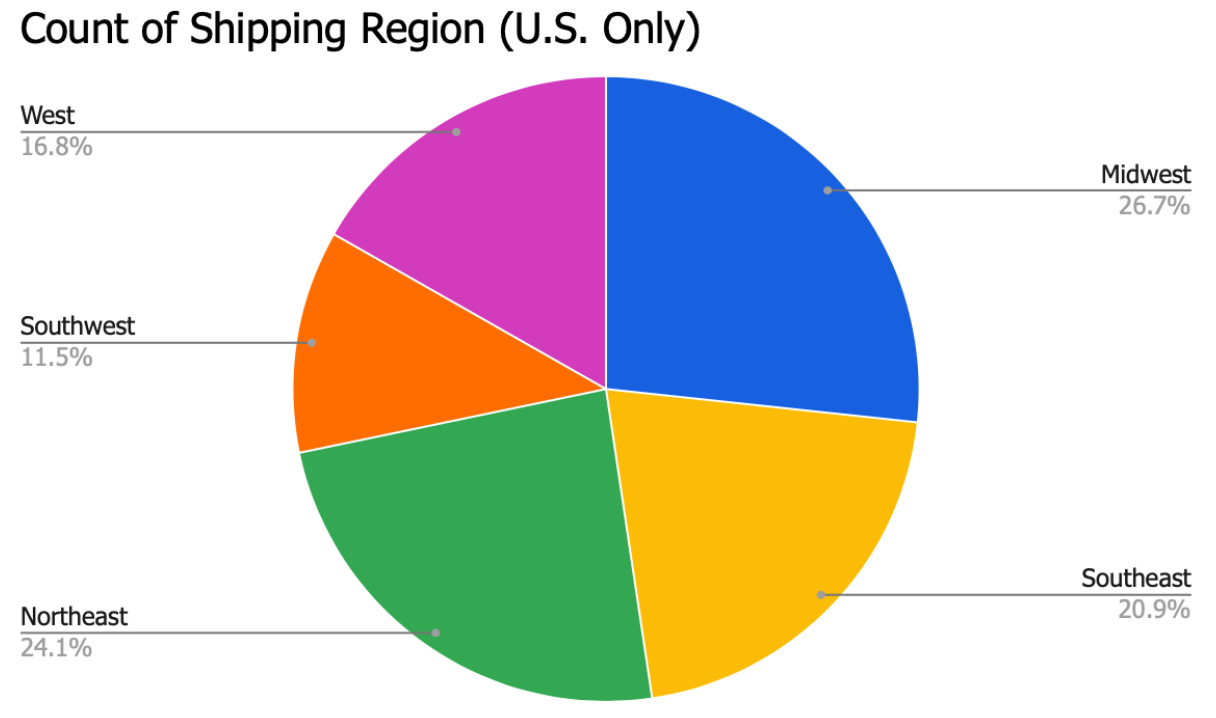Can Swifties Force UMG to Take Action on Merch?
Unpacking what happened to TTPD's (un)signed CDs.
Wonderful Things is a newsletter for curious swifties. To receive new posts and support my work, consider becoming a free or paid subscriber and sharing this link with the swifties in your life.
When signed CDs for The Tortured Poets Department dropped on April 13, they came with a bait and switch in the form of captchas, an order limit of one per person, and a redesigned order history. Many swifties took the long-awaited improvements as a sign that UMG would finally address years’ worth of feedback about shoddy quality, unreliable shipping, and a lack of protection against bots and resellers. They were soon disappointed.
Following TTPD’s release, fans took to social media in droves to show that their signed CDs were missing a crucial component: Taylor’s signature. After a few frustrating exchanges with UMG’s customer service team, word spread that people should film themselves opening their CDs, and those impacted collected online to share tips for getting a replacement.
UMG itself didn’t seem to know what was going on, as within a few days of replacement signed inserts going out, some swifties reported that even their replacement had arrived unsigned.
Meanwhile, screenshots from reseller groups on Telegram and other platforms had begun circulating showing that hundreds of signed inserts had been acquired — most with the coveted heart — giving rise to a theory that someone involved in the shipping process had gotten their hands on a giant stack of signed inserts and replaced them with unsigned versions.


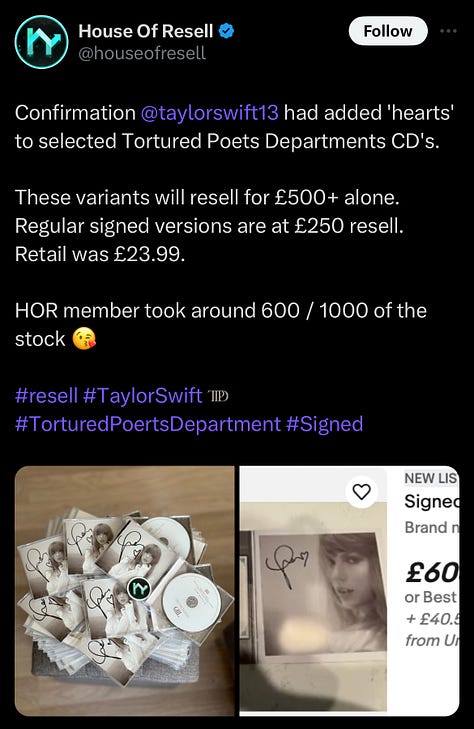
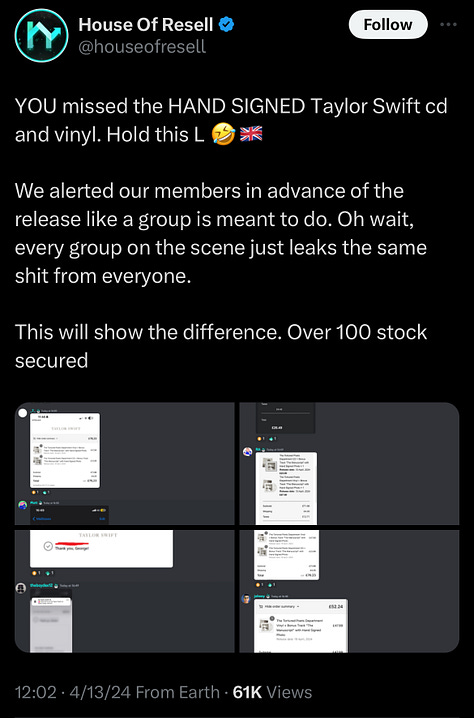
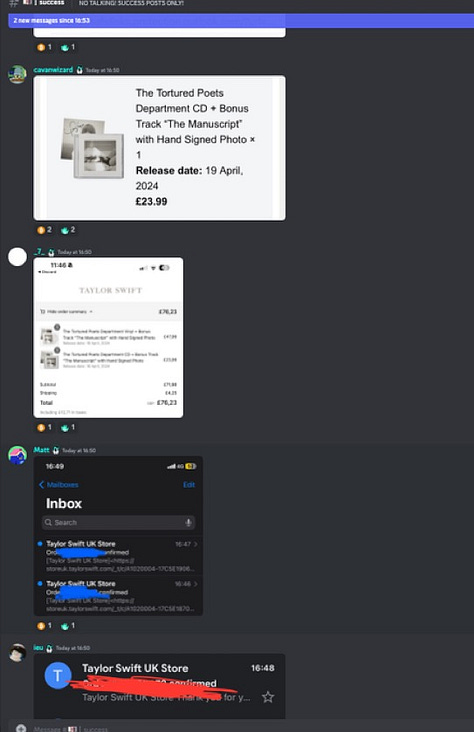
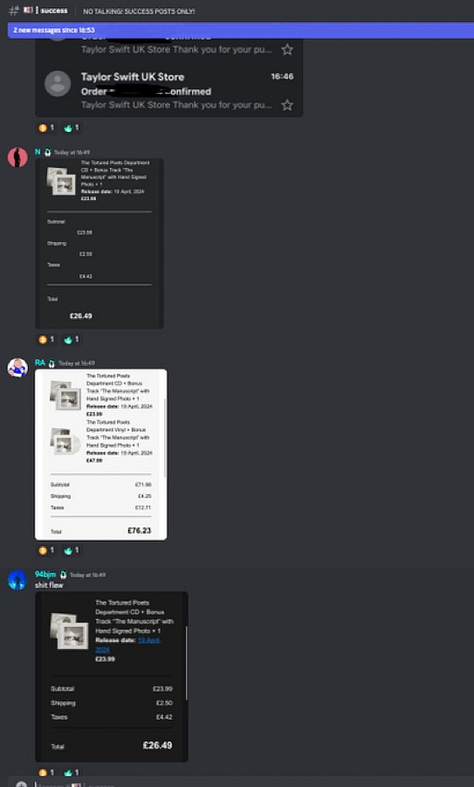
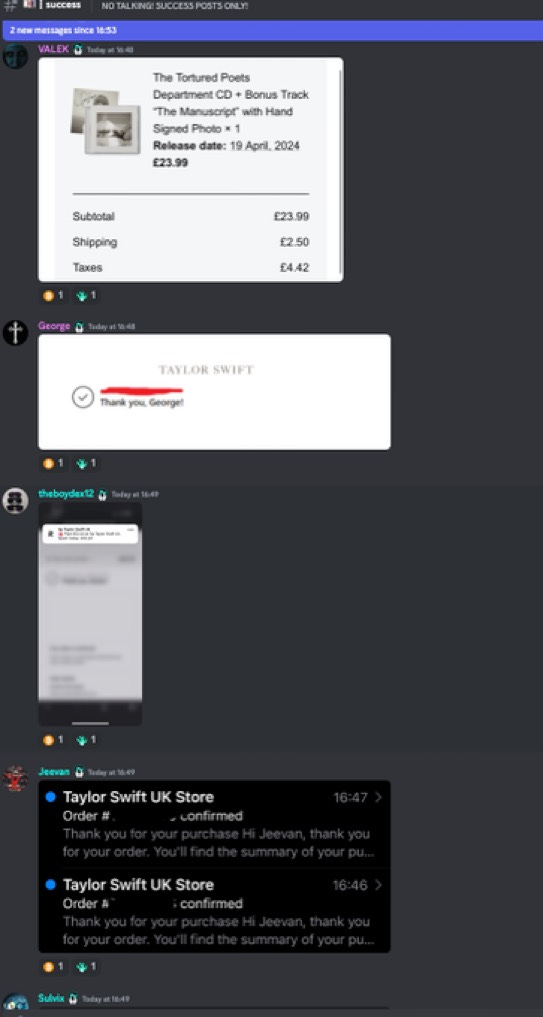
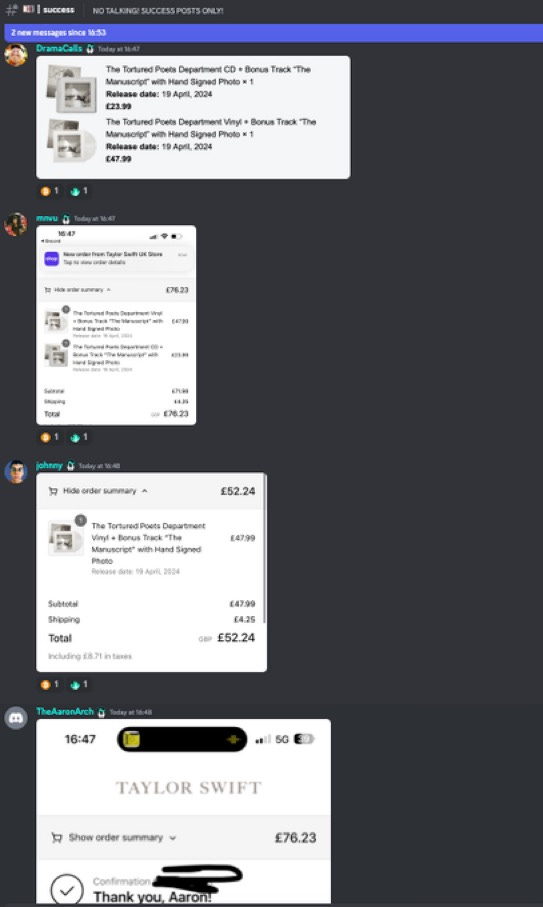
We don’t know how many signed CDs were initially made available or how many people contacted UMG, and the company wasn’t eager to provide that information when I reached out, instead supplying me with this statement, attributed to a spokesperson:
“We have identified that a small number of orders of the signed CD format of the album were inadvertently inserted with unsigned photocards during packing and have actively sent out replacement signed photocards via expedited delivery, which fans should begin receiving imminently.”
A Snapshot of Something Bigger
After receiving an unsigned CD on April 23, an anonymous Swiftie who we’ll call Alex decided to try to quantify what she was observing on Twitter.
“After posting a picture of my unsigned insert to my timeline, I was met with comments like, ‘Not you, too,’” Alex told me. “At this point, all of swiftie Twitter was aware of the issue, but no one really knew how many people it was affecting.”
The swiftie, inspired by her academic and professional background working with data, decided to create a Google Form to see if any patterns jumped out from the responses — which numbered 195 by April 27. (Full disclosure: My CD arrived unsigned on April 23, so one of those responses was my own.)
“I know you won’t be believed unless you have empirical evidence — and sometimes, not even then,” Alex told me. “My background is also in equity and justice, so I was thinking about how UMG holds a lot of power as a corporation of its size and what that means.”
The 193/195 survey responses that came from the U.S. were dispersed fairly evenly across regions, with the Northeast and Midwest slightly more impacted (although we can’t judge proportionality without access to UMG’s order data).
Of the 97 people who had reported the issue to UMG at survey time, 60% hadn’t received a response; 20% had been offered a replacement; 11% had been offered a refund; and 9% had initially been told the CDs were out of stock but later offered a replacement. Swifties communicated with at least 75 different UMG representatives via email.
How Did We Get Here?
Alex is clear that the survey has limitations: We can’t judge the extent of the problem since we don’t know how many signed CDs were shipped and how many people received them unsigned. But the data offer a snapshot of a problem that has been worsening for years.
Since 2018, to be exact, which feels like several lifetimes ago but was recent enough that even many younger swifties wax on nostalgically about the days of soft, thick sweatshirts; personalized customer service; and little surprise gifts from Taylor Nation. Our world felt so much smaller during reputation, and the store felt like a small business that was just starting to make it big.
As is usually the case when corporations get their hands on something beloved, things started to fall apart as soon as Taylor moved control of merch from her team to Universal Music Group as part of her new contract ahead of 2019’s Lover. Over time, quality decreased and prices increased; customer service became unreliable; and merch drops became sources of anxiety instead of excitement.
It doesn’t have to be this way.
Building Collective Power
Alex has had swifties attribute their success in getting a replacement signed CD to both her and @TayMerchProbs, an account dedicated to documenting and helping people navigate their UMG merch woes.
“I only knew what to do because of other swifties who had documented and shared their successful tactics,” Alex said. “So there’s this collective power that is achieved through community and the passing of knowledge.”
@TayMerchProbs, who asked to remain anonymous to protect her privacy, has used her account to help swifties troubleshoot problems with their merch orders and educate people about how to use their power as consumers to find solutions. She worries that swifties will be taken advantage of by unscrupulous resellers who won’t hesitate to forge Taylor’s signature if they get their hands on the blank inserts.
“There needs to be a better way to provide an authenticity system; that is just a consideration to protect fans and protect the consumer and protect your artists’ merchandise,” she said. “I don’t know why they don’t implement it. Is it because it’s hard or extra work? Maybe, but that’s the right thing to do.”
Both swifties hope to use their experience to help fellow fans recognize and wield their collective power as consumers.
“I like to think my survey really helped increase swifties’ power against UMG,” Alex told me. “Both in terms of building an empirical evidence base and in terms of building collective knowledge: over what is normal and what is not, when to push back, (and) what words you should use to be more effective in communicating with UMG and achieving a resolution.”
They highlighted how difficult it can be to push for change when you don’t know how widespread a problem is.
“I think one thing the survey showed best is that data is power. When I didn’t have any real sense of how many people were affected by the issue, I was at a loss for what to do,” they said. “I was also hyper-aware of the fact that UMG could say this was an isolated incident or only affected a few people and I didn’t have anything objective to back me up in challenging that.”
@TayMerchProblems, too, pointed to the importance of coming together as a collective to deal with an organization as opaque as UMG. Alex managed to collect nearly 200 responses on Twitter, but what about the swifties who only use Facebook? Reddit? Instagram? “At the end of the day,” TMP said, “I think there were a lot more people than they originally disclosed.”
Where Does That Leave Us?
Increasingly, fans have started to recognize their collective power on a scale larger than VMAs voting campaigns, building on efforts by groups like Fandom Forward to organize around issues like climate change, racial justice, and immigration reform.
It makes sense: Passionate fandom can bring out the organizer in all of us. You may start by rallying swifties to win Taylor 13 million VMAs, but gradually you apply those skills to raising money for someone going through something difficult, or rallying to drown out a bigoted trending topic. And eventually, you come across swifties like Alex and TMP who see even greater potential in our fandom.
All of your swiftie experience, whether you’ve asked your followers to vote in the VMAs or organized a streaming party for a new single, whether you’ve rolled up to a picket line because of your fandom or organized a donation drive — all of it has helped you build organizing muscles that are just waiting to be used for good.
It’s easy to feel powerless against the merch bots, resellers, and UMG’s corporate excess — and the truth is that each of us is when we go it alone.
But you’re not on your own, kid. Never in history has a fandom had the potential that swifties have right now to use our collective power to push for change in the music industry, whether you’re passionate about artists’ rights, corporate accountability, breaking up ticketing monopolies, or just getting your damn merch on time and in one piece.
The first step is deciding to try.
Part of my goal with Wonderful Things is to provide a space for us to learn from swifties who are doing this work, as well as from political organizers, academics, and others engaged in this space. Subscribe for free below and join us for the ride!





